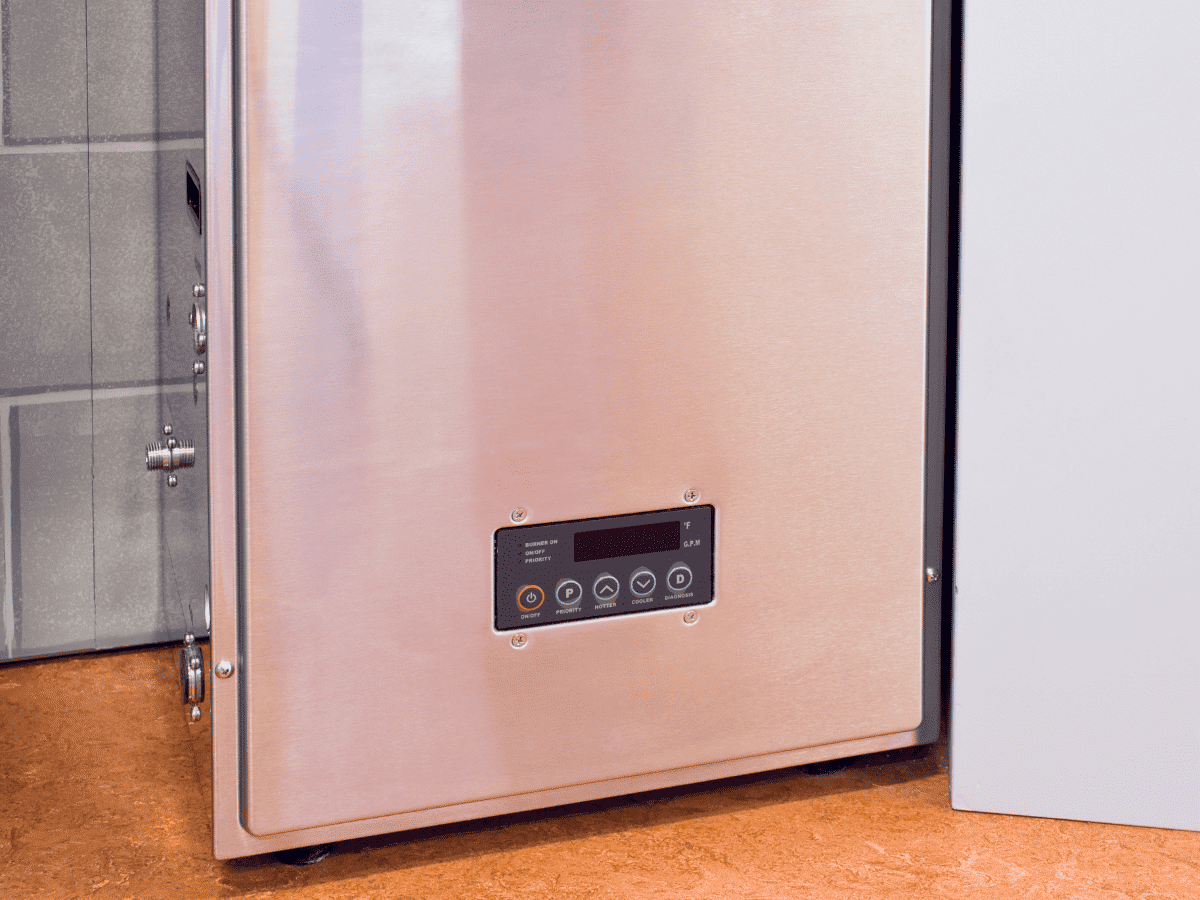Regarding tankless water heaters, two main types are available on the market – condensing vs non condensing tankless water heaters. Both systems have advantages and disadvantages, so it’s essential to understand their differences before deciding which type is best for you.
What Is A Non Condensing Tankless Water Heater?
A non condensing tankless water heater is a type of water heater that does not use condensation to heat the water. Instead, it utilizes a gas burner to heat the water. The burner is connected directly to the pipes in your home, and when you turn on your hot water tap, the burner activates and quickly heats the incoming water. This eliminates the need for a storage tank, saving you space and energy.
How Do Non Condensing Tankless Water Heaters Work?
Non condensing tankless water heaters are popular for many households due to their energy-saving capabilities and continuous hot water supply. But how exactly do these units work?
The operation of a non condensing tankless water heater starts when you turn on a hot water tap in your home. Cold water flows into the unit through an inlet pipe, where it is rapidly heated as it passes through the primary heat exchanger. This heat exchanger is powered by a main burner that ignites and generates heat, which is then transferred to the water.
The combustion process within the non condensing unit creates hot gases or exhaust gases. Unlike condensing models, these gases are expelled through the flue and vented outside without further utilization. Unfortunately, this means that the excess heat contained in these gases is lost, resulting in slightly lower overall energy efficiency than condensing tankless water heaters.
Once the water has been heated, it is delivered to the hot water tap on demand. This on-demand heating process ensures that you have hot water whenever you need it without needing a storage tank.
What Is A Condensing Tankless Water Heater?
A condensing tankless water heater is a type of water heating system that uses condensation to capture and utilize heat typically lost in exhaust gases. This process increases the unit’s overall efficiency, allowing it to operate with greater energy-saving capabilities.
How Does A Condensing Water Heater Work?
A condensing tankless water heater is similar to a non condensing unit in that it utilizes a gas burner and heat exchanger to heat incoming cold water. However, the most significant difference between these two systems lies in how the exhaust gases are treated. In a condensing system, these gases are routed through a secondary heat exchanger, where the heat is recovered and used to preheat the incoming cold water. As a result, you get a more efficient system with higher overall energy savings.
The condensing process also helps reduce emissions of harmful gases, as the exhaust gases are cooled down before being released into the atmosphere. Additionally, these systems tend to be quieter than their non-condensing counterparts due to their use of a secondary heat exchanger.
Condensing vs Non Condensing Tankless Water Heaters
Non condensing tankless water heaters are popular for many households due to their simplicity, convenience, and cost savings. The primary advantage of this type of system is that it does not require a storage tank to provide hot water on demand. This eliminates the need for a large tank that takes up valuable space in your home and can be costly to maintain. Additionally, non condensing units tend to be more affordable than their condensing counterparts.
However, non condensing water heaters have lower energy-efficiency ratings than condensing models. This is because the exhaust gases are not used to preheat the incoming cold water, resulting in some of the excess heat being lost. Additionally, these systems also produce more emissions than condensing units.
Condensing tankless water heaters offer higher energy-efficiency ratings and lower emissions than non condensing models. This is because they utilize a secondary heat exchanger to capture and reuse the heat contained in exhaust gases, resulting in more significant savings. Additionally, condensing systems also tend to be quieter than non condensing units.
However, condensing tankless water heaters tend to be more expensive than non condensing models. Additionally, they require more complex installation and can take up more space due to the need for a secondary heat exchanger.
Which Type Of Water Heater Is Better?
When it comes to determining which type of water heater is better, it depends on your individual needs and preferences. Non condensing tankless water heaters tend to be more affordable and simpler to install, making them the perfect choice for those on a budget. However, their lower energy-efficiency ratings mean you will spend more money in the long run.
On the other hand, condensing tankless water heaters offer higher energy-efficiency ratings and lower emissions. However, they require more installation complexity and can be more expensive upfront. Ultimately, it is up to you to decide which type of water heater best fits your specific needs and budget.
In conclusion, whether you choose a condensing or non condensing tankless water heater, the key is to find the right fit for your home and your needs. Both options have advantages and disadvantages, so it’s essential to consider factors like energy efficiency, cost, and installation requirements. No matter which type you choose, upgrading to a tankless water heater will undoubtedly bring convenience and savings to your daily life. So go ahead, make the switch, and enjoy endless hot water without the hassle of a bulky tank!
If you’re looking to upgrade to a tankless water heater, now is the perfect time to take the plunge with Water Heater Wiz! Our experienced technicians can answer any questions you may have and guide you through the process of choosing a water heater that will best fit your needs!





